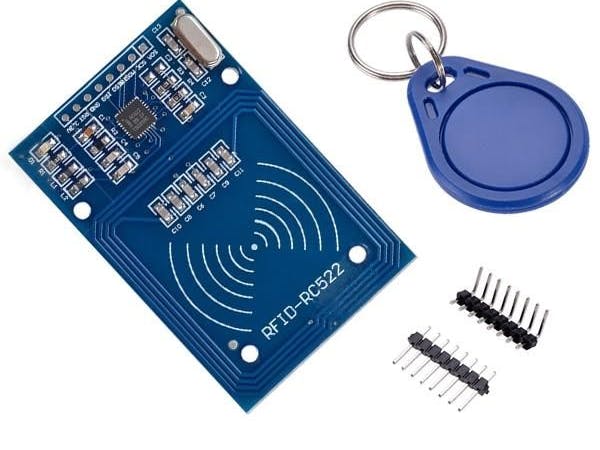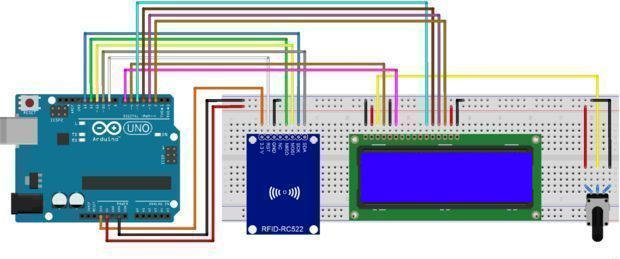Hardware components | ||||||
_ztBMuBhMHo.jpg?auto=compress%2Cformat&w=48&h=48&fit=fill&bg=ffffff) |
| × | 1 | |||
 |
| × | 1 | |||
 |
| × | 1 | |||
| × | 1 | ||||
 |
| × | 1 | |||
 |
| × | 1 | |||
Please note there are two scripts of code.
Read moreRFID Reader (Data Reader)
ArduinoPlease use this to find your cards ID. THIS ALSO CHANGES THE UID So you can have a different one
//All credit to Technic1510
//
//
//
//
//
#include <SPI.h>
#include <MFRC522.h>
#define RST_PIN 9 // Configurable, see typical pin layout above
#define SS_PIN 10 // Configurable, see typical pin layout above
MFRC522 mfrc522(SS_PIN, RST_PIN); // Create MFRC522 instance
/* Set your new UID here! */
#define NEW_UID {0xDE, 0xAD, 0xBE, 0xEF}
MFRC522::MIFARE_Key key;
void setup() {
Serial.begin(9600); // Initialize serial communications with the PC
while (!Serial); // Do nothing if no serial port is opened (added for Arduinos based on ATMEGA32U4)
SPI.begin(); // Init SPI bus
mfrc522.PCD_Init(); // Init MFRC522 card
Serial.println(F("Warning: this example overwrites the UID of your UID changeable card, use with care!"));
// Prepare key - all keys are set to FFFFFFFFFFFFh at chip delivery from the factory.
for (byte i = 0; i < 6; i++) {
key.keyByte[i] = 0xFF;
}
}
// Setting the UID can be as simple as this:
//void loop() {
// byte newUid[] = NEW_UID;
// if ( mfrc522.MIFARE_SetUid(newUid, (byte)4, true) ) {
// Serial.println("Wrote new UID to card.");
// }
// delay(1000);
//}
// But of course this is a more proper approach
void loop() {
// Look for new cards, and select one if present
if ( ! mfrc522.PICC_IsNewCardPresent() || ! mfrc522.PICC_ReadCardSerial() ) {
delay(50);
return;
}
// Now a card is selected. The UID and SAK is in mfrc522.uid.
// Dump UID
Serial.print(F("Card UID:"));
for (byte i = 0; i < mfrc522.uid.size; i++) {
Serial.print(mfrc522.uid.uidByte[i] < 0x10 ? " 0" : " ");
Serial.print(mfrc522.uid.uidByte[i], HEX);
}
Serial.println();
// Dump PICC type
// MFRC522::PICC_Type piccType = mfrc522.PICC_GetType(mfrc522.uid.sak);
// Serial.print(F("PICC type: "));
// Serial.print(mfrc522.PICC_GetTypeName(piccType));
// Serial.print(F(" (SAK "));
// Serial.print(mfrc522.uid.sak);
// Serial.print(")\r\n");
// if ( piccType != MFRC522::PICC_TYPE_MIFARE_MINI
// && piccType != MFRC522::PICC_TYPE_MIFARE_1K
// && piccType != MFRC522::PICC_TYPE_MIFARE_4K) {
// Serial.println(F("This sample only works with MIFARE Classic cards."));
// return;
// }
// Set new UID
byte newUid[] = NEW_UID;
if ( mfrc522.MIFARE_SetUid(newUid, (byte)4, true) ) {
Serial.println(F("Wrote new UID to card."));
}
// Halt PICC and re-select it so DumpToSerial doesn't get confused
mfrc522.PICC_HaltA();
if ( ! mfrc522.PICC_IsNewCardPresent() || ! mfrc522.PICC_ReadCardSerial() ) {
return;
}
// Dump the new memory contents
Serial.println(F("New UID and contents:"));
mfrc522.PICC_DumpToSerial(&(mfrc522.uid));
delay(2000);
}
//All Credit Technic 1510
//
//
//
//
#include <SPI.h>
#include <MFRC522.h>
#include <LiquidCrystal.h>
#define SS_PIN 10
#define RST_PIN 9
MFRC522 mfrc522(SS_PIN, RST_PIN);
LiquidCrystal lcd(6 , 7, 5, 4, 3, 2);
void setup()
{
SPI.begin();
mfrc522.PCD_Init();
lcd.begin(16, 2);
lcd.print("Scan RFID Card");
}
void loop()
{
if ( ! mfrc522.PICC_IsNewCardPresent())
{
return;
}
if ( ! mfrc522.PICC_ReadCardSerial())
{
return;
}
lcd.clear();
lcd.begin(16, 2);
lcd.print("UID tag :");
String content= "";
byte letter;
for (byte i = 0; i < mfrc522.uid.size; i++)
{
lcd.setCursor(0, 1);
lcd.print(mfrc522.uid.uidByte[i] < 0x10 ? " 0" : " ");
lcd.print(mfrc522.uid.uidByte[i], HEX);
content.concat(String(mfrc522.uid.uidByte[i] < 0x10 ? " 0" : " "));
content.concat(String(mfrc522.uid.uidByte[i], HEX));
}
lcd.clear();
lcd.begin(16, 2);
lcd.print("Message : ");
content.toUpperCase();
if (content.substring(1) == "E0 28 E9 87") //Plz change to your cards UID
{
lcd.setCursor(0,1);
lcd.print("Authorized");
delay(3000);
lcd.clear();
setup();
}
else {
lcd.setCursor(0, 1);
lcd.print(" Access denied");
delay(3000);
lcd.clear();
setup();
}
}









Comments
Please log in or sign up to comment.